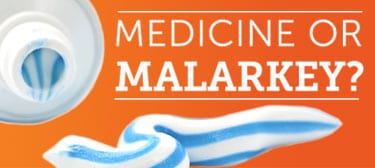Medicine or Malarkey: Can Toothpaste Clear Your Skin?
September 17, 2015

Acne. Ruiner of prom pictures. Self-esteem assailant. A complex complexion problem with no clear answer. But it’s a problem almost everyone can identify with, and not just teens. Though blemishes are at their worst for most people during adolescence, adult acne is fairly common, particularly among women ages 20-49. There are a number of topical and oral medications one can use to treat and manage acne. You may have heard claims about the healing powers of home remedies and natural products, such as toothpaste. Do they have any merit? Let’s take a look at some common misconceptions about causes and treatments of acne.
Acne is caused by dirty skin. You should vigorously wash your face multiple times a day. (You shouldn’t.)
Acne occurs when pores are clogged by skin oils, eventually leading to inflammation, turning into pimples, lumps or nodules. The cause of acne is not completely understood. Scientists and doctors speculate it’s related to hormones and heredity, among other reasons.
Contrary to popular opinion, blackheads are not, in fact, black because they are dirt. And while it’s important to wash away makeup, sweat and other irritants off your face (with a gentle cleanser and lukewarm water up to twice daily), over-washing your face can exacerbate the problem. Washing your face too much or with harsh products can dry out your skin, causing your face to overcompensate and create more oil. Additionally, scrubbing can irritate and damage the skin, so be gentle.
The sun will help clear that up. (It won’t.)
Indeed, the sun may initially help with acne, as a small amount of exposure to sunlight reduces inflammation in general. But over time, the sun will open up pores, potentially resulting in blackheads. Also, skin damage from the sun reduces skin’s ability to repair itself, meaning longer-lasting marks and scars from acne. Don’t even think about using a tanning bed to treat acne either. There’s no scientific evidence suggesting UVA light helps clear up blemishes, but there is consensus that using tanning beds damages skin and leads to cancer.
Home remedies are the best way to treat acne. (They aren’t, but they can help in some cases.)
There’s no lack of online information on home remedies that will clear your face up. There’s more validity to some solutions than others. Toothpaste has been cited for decades as an effective zit-fighting substance. Toothpaste, indeed, can cause pimples to dry out, as it contains alcohol, baking soda, hydrogen peroxide and essential oils, but it will also irritate and damage your skin — not really a net gain. It’s in no way superior to over-the-counter products with benzoyl peroxide and salicylic acid, which are the recommended treatment).
Natural at-home remedies associated with clearing up acne when applied topically include honey, tea tree oil, aloe (make sure any aloe product you buy is mostly pure aloe), fresh mint, citrus fruits, and apple cider vinegar. Check this list of acne-relief substances from The Mayo Clinic for more information.
The important thing to remember about these treatments is that “natural” does not mean it can’t harm you. People like to avoid dangerous “chemicals,” but foods/oils used as medicine likely can contain much of the same active ingredients. Lemon, lime and other citrus oils on the skin increase sensitivity to the sun and can lead to unsightly, painful blisters. Use these oils in the evenings, or wash them off before you go outside. You may have an allergic reaction to other foods and oils applied to the skin. It’s best to consult with a clinician to see if a referral to a dermatologist is needed to treat your acne. Always seek out a medical professional for severe cases of acne, or if painful large nodules or cysts develop.
